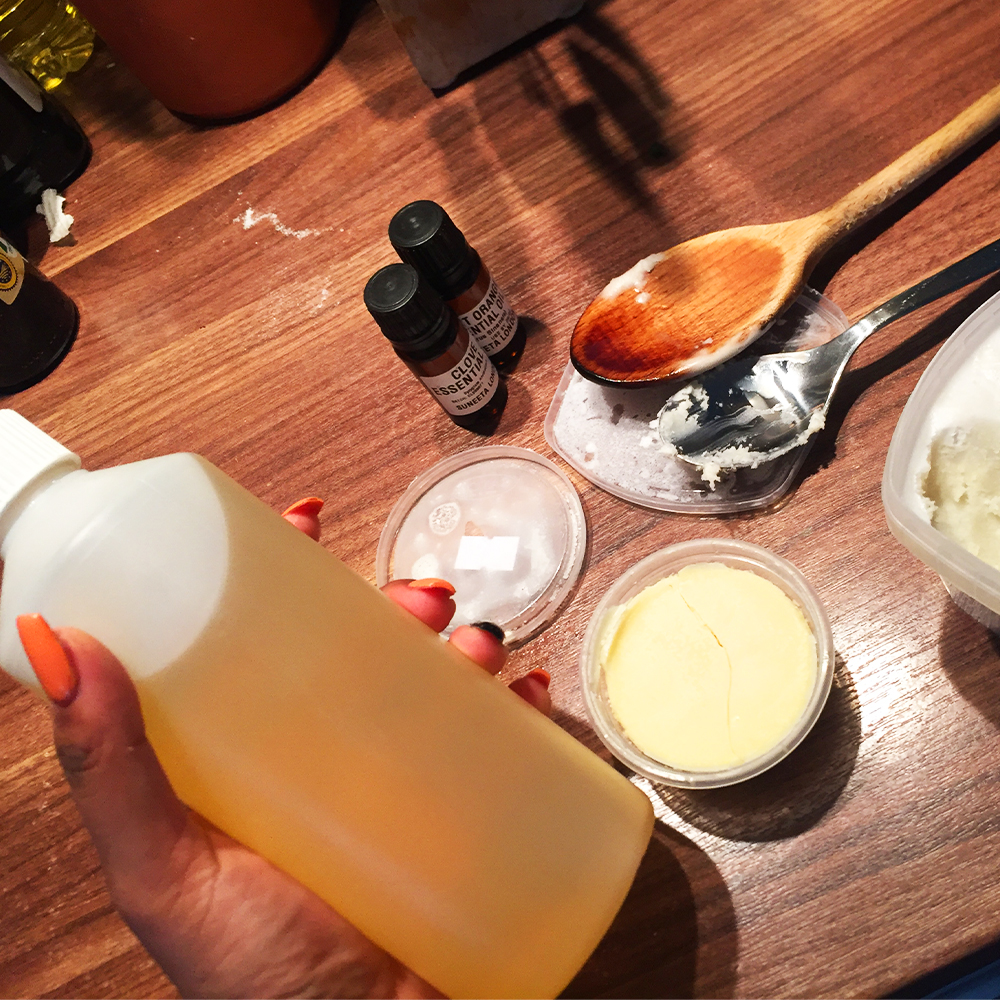 Kieran Yates is a London-based journalist, broadcaster and author covering culture and politics. She is the author of Generation Vexed and The Good Immigrant, and her work can be found across the BBC, The Guardian and a host of other places. You can find her on Twitter and Instagram. Here she explores the rise once again of alchemy in beauty, and why it’s having such a moment…
Kieran Yates is a London-based journalist, broadcaster and author covering culture and politics. She is the author of Generation Vexed and The Good Immigrant, and her work can be found across the BBC, The Guardian and a host of other places. You can find her on Twitter and Instagram. Here she explores the rise once again of alchemy in beauty, and why it’s having such a moment…
My grandmother was a beauty alchemist. She would crouch, on a wooden stool mixing up pastes of deep orange and thick, gritty yellows, then beckon me over with curious smells ready to be lathered on my cheeks. Back then, I was relatively immune to the wisdom of my elders, seeing these as dubious beauty claims, and much more seduced by what I saw on TV back in the UK – slick, shiny haired women advertising sensual glass bottles of tonic, and pharmaceutical words I didn’t understand. My teen years were a glut of buying Clearasil and other zit-be-gone type offerings with promises of eradicating all my anxieties. Most of it was, in short, purchased on a wing and a prayer. I had pretty much no idea what was contained in these mysterious bottles, I just hoped the long 13-letter words on the back of the bottle did what I wanted.
It makes perfect sense that we’d react against our increasingly polluted urban centres and lust for a return to nature and climate-friendly alternatives
If then, beauty was an eternal mystery, what the advent of the internet has brought with it are vast swathes of information that are basically, digital archives of what my grandmother knew long before I’d caught up. It has bought with it a return to craft, the idea of tangibly making things (through seeking respite from the continual online cycle), and also a desire to reclaim the cosmetic jargon and corporate promises of ‘turmeric enriched’ or ‘Manuka honey’. What if you could just make it straight from the source?
It’s the reason why alchemy has a power to it, ensuring that you are in control of what you consume. And why tubs of shea butter whips are double boiled and heated in my kitchen with regularity, manuka honey and turmeric masks are slathered fortnightly, and castor oil and aloe vera hair masks are lovingly prepared and cooled in the fridge. We increasingly have a desire to ask questions, and provide ourselves with an education that we can pass down. After all, the cycle of wisdom about aloe vera combating dandruff might come in useful should I need to attack child scalps in the future.
In an increasingly time and finance-poor economy, making and producing could act as real self-care
This movement in the beauty world has been bubbling for some time and, logically speaking, it makes perfect sense that we’d react against our increasingly polluted urban centres, and lust for a return to nature and climate-friendly alternatives. The trend towards ‘natural’ or ‘raw’ skincare has taken off in what might be a natural extension of veganism or climate awareness and as such, has entered the mainstream in a huge way. Now merging ancient techniques – many of which originate in global communities of colour – with current skincare routines has become part and parcel of beauty regimes across the country.
Last year I spoke to Lucy Pottinger, head of category beauty and aromatherapy at Holland & Barrett, about this, and she made the point that there was a clear market for this kind of back-to-basics beauty. “Charcoal, due to its association with detox/absorbing toxins, has seen a massive spike in sales over the last two years,” she told me, alongside a “90% increase in turmeric product sales over the past few months”.

Of course, female spaces historically have been about empowering domestic labour in the kitchen to make meals. It makes sense that this magic would extend to make your own beauty secrets – homemade potions based on the wisdom of elders, on managed self-care within budgets, and craft. The message is clear – you can do it for yourself, sharing ‘secrets’ kept quiet as a historical way to keep women competitive with one another, and create communities with group chats sharing apple cider vinegar (ACV) treatments (like my witchy Whatsapp group chat where one of my friends is so evangelical about apple cider vinegar I call her Aunty ACV), lifting one another with homemade elixirs.
In this, a generation of young people are leading from the front because it’s an attractive prospect – to engage with women, offer advice, and permit yourself to make for yourself. In an increasingly time and finance-poor economy, making and producing could act as real self-care. Not the commodified, take-a-bubble-bath-to-cure-all-ills type, but real, tangible contributions. After all, filling tupperware with shea butter, and making quick lip scrubs from sugar and beetroot is simpler and more satisfying that you might imagine.
There is a market for a new generation of beauty alchemists, taking the tradition of witches and aunties, and reclaiming them in their own way, by making batches of potions for the pursuit of youth, health and meditation. There are many women who have gone before us, who have taught us to respect the properties of what the earth provides us. Even in an inner city, on my worktop, I can find away to be connected to them – one thick, orange paste at a time.
